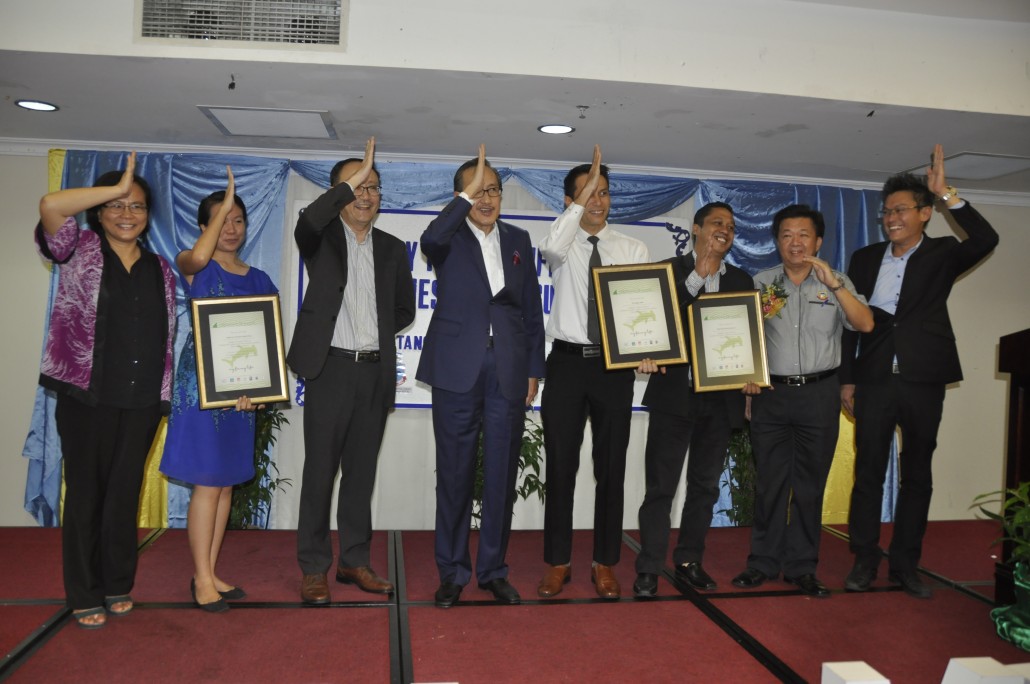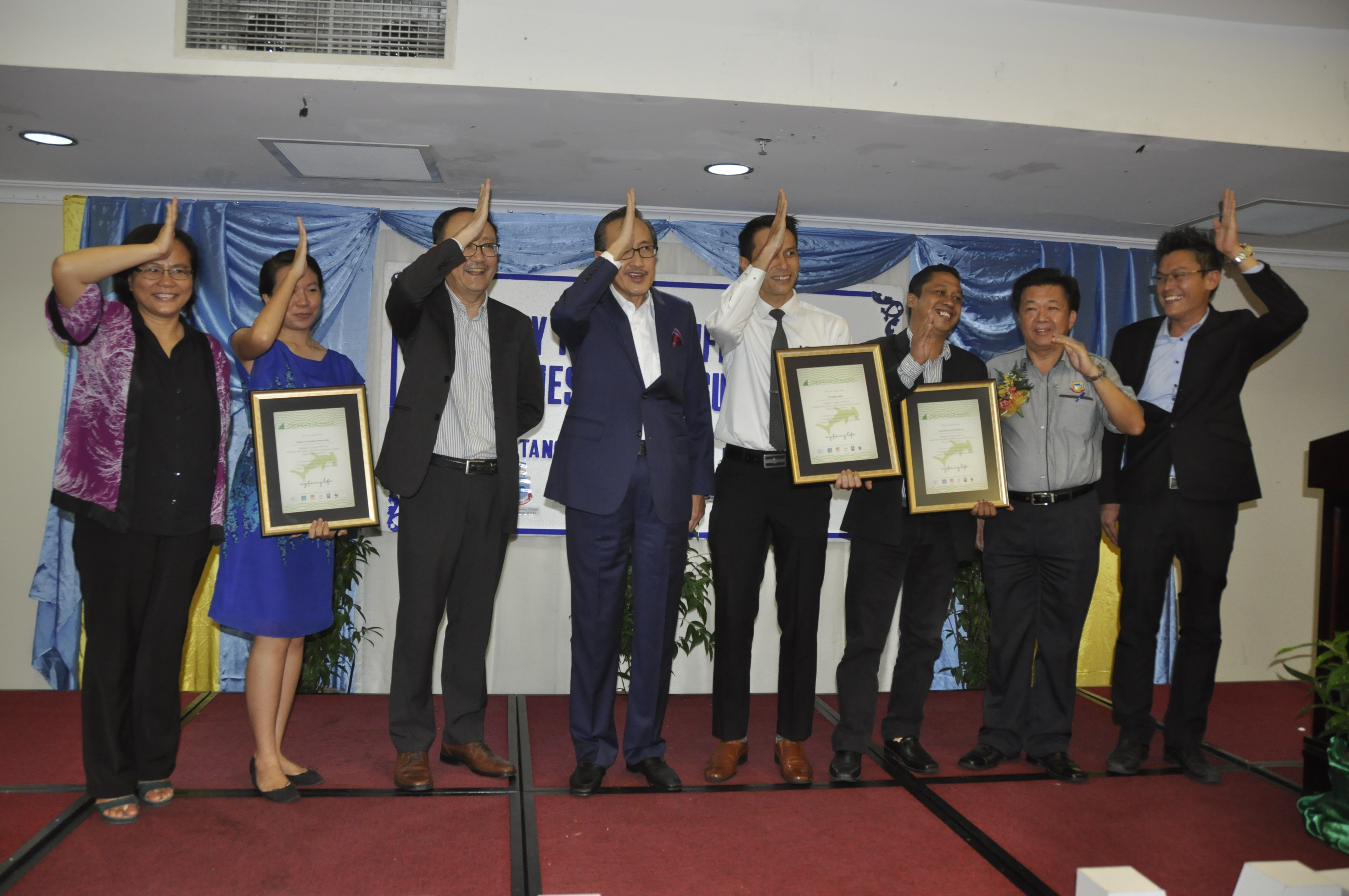jessica2016-10-09T07:20:56+08:00TAWAU: SMR Aquaculture Sdn Bhd (SMRA), a Sabah-based company, has achieved the first for the state in the field of integrated farming to produce large scale organic food supply, adopting a three-prong business model in aquaculture, hydroponic farming and solar energy production.
SMRA’s Solar PV and Aquaphonic Farm located at Kampung Sungai Kalumpang Tawau, near its own resort — the Sipadan Mangrove Resort, was partly financed by Unit Peneraju Agenda Bumiputera’s (Teraju) RM 2.64 million facilitation fund.
In addition to creating revenue through aquaculture, hydroponic farming and solar energy production, this project which is valued at RM48.35 million will also boost Sabah’s tourism industry, create job opportunities for the local community in Tawau and at the same time fulfil its social responsibility in environmental protection.
Datuk Haji Abdul Rahman Dahlan, Minister in the Prime Minister’s Department and chairman of Teraju made a visit to SMRA’s solar PV and aquaphonic farm accompanied by
Datuk Haji Tawfiq Datuk Haji Abu Bakar Titingan, Minister of Youth and Sports and Teraju chief executive officer Dato Husni Salleh.
The Minister then participated in a dialogue session on ‘Business Opportunities in Sabah’ involving 500 representatives of Bumiputera companies at the resort, yesterday.
According to Husni: “SMRA is one of the 432 Bumiputera projects approved for the Facilitation Fund. As at the end of August this year, a total of RM 1.5 billion in have been approved for these projects, creating 41,601 jobs. This fund was established as a tipping point for private sector Bumiputera investments and acts as a catalyst for infrastructure and equipment components of Bumiputera projects, particularly in high-impact NKEA sectors. For Sabah, a total of RM 99.35 million fund for 41 Bumiputera projects have been approved, providing support for Sabah business community to participate in a more self-sufficient and sustainable economic activities. The total investment value for these projects in Sabah stood at RM 879.45 million. With this fund and various other programmes and initiatives made available by Teraju and other government agencies, we urge Bumiputera companies to participate in projects that will create job opportunities, build infrastructure and boost local economic growth.”
Other on-going support to build and grow local businesses to spur Sabah’s economic growth include the Dana Pembangunan Usahawan Sabah, TeraS programme, TeraS Fund and Skim Usahawan Permulaan Bumiputera (SUPERB). Funds under the Dana Pembangunan Usahawan Sabah have been used to facilitate entrepreneurial capacity and infrastructure efforts aimed to assist local entrepreneurs and SMEs. At present, 45 Bumiputera companies from Sabah have been identified as ‘high performing’ under the TeraS programme and 10 of these companies have been given approval for TeraS Fund totalling RM9.91 million, added Husni.
John Nip shared: “The Solar PV Farm Project is one of the company’s initiatives to compliment the conventional electricity grid connection with solar as a source of energy into our organic farming system. Our aim is for the business to contribute in saving the environment by reducing carbon emission. We have also gone one step further in coral preservation by offering alternative jobs and providing training to local fishermen to be boatmen and divers, in helping to restore damaged corals. This initiative is in collaboration with Universiti Malaysia Sabah (UMS) and the local authorities, to enforce policy to local fishermen.
The alternative solar energy portion of the project is part of the Feed-in-Tariff (FiT) programme under the Sustainable Energy Development Authority (SEDA) Malaysia, where SMRA also earns income from Sabah Electricity Sdn. Bhd., through SMRA’s PV generated energy. The average monthly income earned from this part of the business is between RM140,000 to RM170,000.
To further boost the farm’s business activities, SMRA has established relationship with investors from China to cultivate fish, oysters and prawns for a potential deal of over USD5 million. For the solar energy business, the company is also in talks with Biomass energy investors.
John added: “The revenue generated from the integrated business model through the supply of fresh produce such as ginger, farm-bred hybrid groupers and shrimps is also able to support SMRA’s Solar PV and Aquaphonic Farm. We are also making plans to invite local villages to set up 15 stores nearby the resort to sell fruits, food and handicraft to tourists, with projection of at least RM8,000 in revenue monthly for each store. We are also in the midst of setting up an Education Centre to educate the public on the importance of sustainable and organic farming and general health knowledge — all these, with the hope of creating more knowledgeable community who can contribute in this business that we have ventured into.”
SMRA’s integrated business has also managed to lure tourists to the company’s Resort and to Tawau through health and wellness tourism. Towards this end, the company plans to build a large jetty to provide ferry services as an alternative, shorter gateway to Mabul, Semporna and Sipadan.
At the event, a dialogue session between Abdul Rahman and TeraS companies on ‘Business Opportunities in Sabah’ was held for Bumiputera companies to gain insights on viable business opportunities and government’s development initiatives in Sabah.
The dialogue session is in line with Teraju’s TeraS Networking Session initiative aimed to establish platforms for meaningful dialogues as well as business collaborations and marketing opportunities.
In the dialogue session Abdul Rahman also shared insights on the Sabah Pan Borneo Highway project and highlighted the multiplier impact on connectivity and mobility to be created via the enhanced road networks. This project will enable accessibility to quality healthcare and education for the rakyat and boost Sabah tourism and agriculture sectors. The project would help to accelerate the state’s development agenda in the areas concerned and elevate Sabah’s socio economic development to the next level.
Under the 11th Malaysia Plan (11th MP), tourism, agriculture and logistics infrastructure development sectors have been identified as the key initiatives for the Sabah Development Corridor. In this regard, the minister welcomed private and industry involvement for close collaboration and partnership.
Commenting on SMRA’s business, Husni Salleh shared: “The initiatives by SMRA falls squarely in one of the strategic approaches of the 11th MP — delivering high-impact projects in sustainable farming and eco-tourism industry while at the same time, carrying a social inclusion aspect through creation of job opportunities, small businesses, tourism opportunities as well as protection of the environment. With the continued support of Teraju and other government agencies through our various programmes and initiatives for Bumiputera businesses we hope that more companies in Sabah will emulate the effort of SMRA to help spur Sabah’s economic growth.”
Source: Borneo Post
 YB Datuk Seri Panglima Masidi Manjun officiated the dialogue session for My Fin My Life together with entrepreneurs, government and non government bodies on October 24, 2016 at Tang Dynasty Park Hotel, Kota Kinabalu.
YB Datuk Seri Panglima Masidi Manjun ketika merasmikan sesi dialog "My Fin My Life" bersama pengusaha, badan kerajaan dan badan bukan kerajaan pada 24 Oktober 2016 bertempat di Hotel Tang Dynasty Park, Kota Kinabalu.
YB Datuk Seri Panglima Masidi Manjun officiated the dialogue session for My Fin My Life together with entrepreneurs, government and non government bodies on October 24, 2016 at Tang Dynasty Park Hotel, Kota Kinabalu.
YB Datuk Seri Panglima Masidi Manjun ketika merasmikan sesi dialog "My Fin My Life" bersama pengusaha, badan kerajaan dan badan bukan kerajaan pada 24 Oktober 2016 bertempat di Hotel Tang Dynasty Park, Kota Kinabalu.



